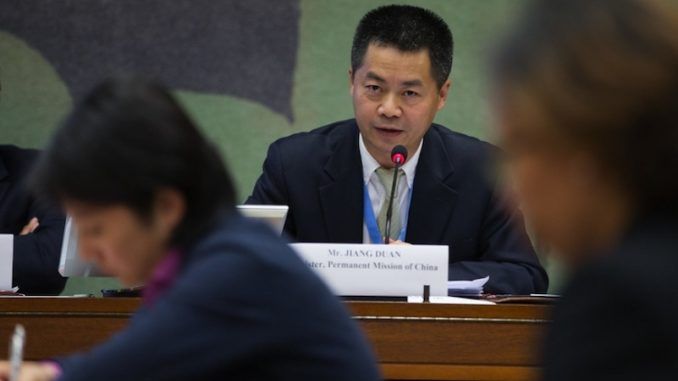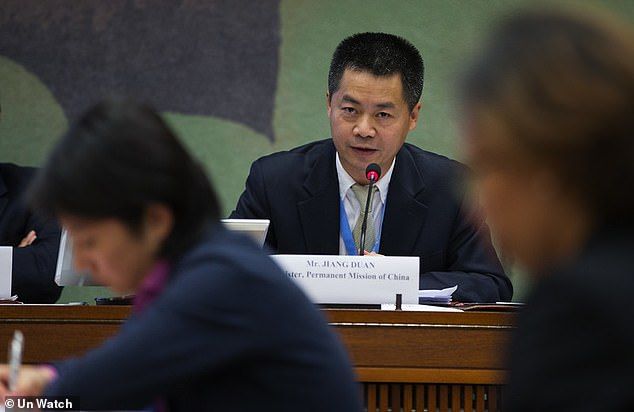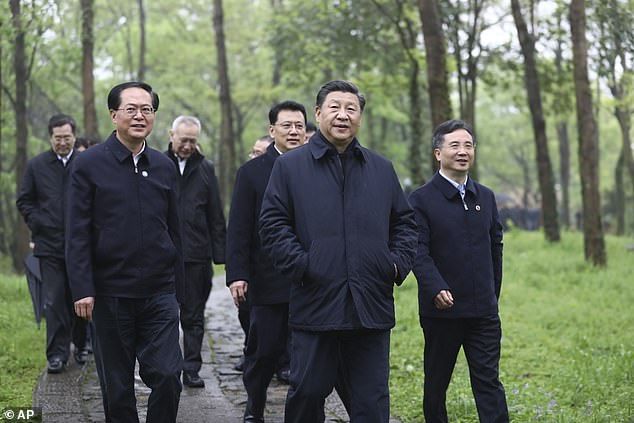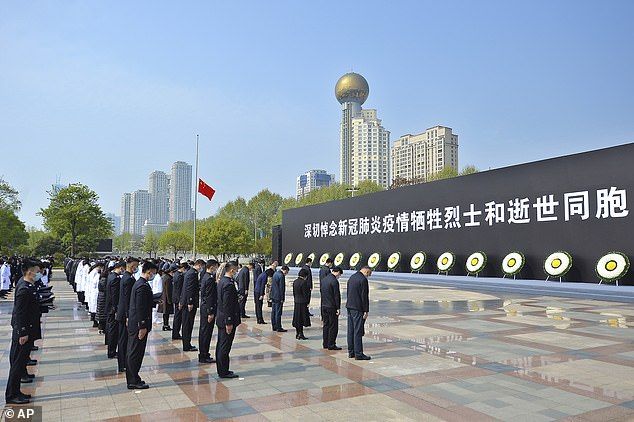
The United Nations has awarded China a place on the UN Human Rights Council despite the communist nation recently covering up the true extent of the coronavirus epidemic in Wuhan, punishing whistleblowers with draconian penalties, and costing the world precious time in preparing for the pandemic.
Delay and deceit over the origins of the coronavirus outbreak cost the world precious time — at the cost of many thousands of lives in the rest of the world.
Human rights activists also point out that China has a long-record of the most serious human rights abuses and has no place lecturing the world about human rights from the pulpit at the United Nations.

BYPASS THE CENSORS
Sign up to get unfiltered news delivered straight to your inbox.
You can unsubscribe any time. By subscribing you agree to our Terms of Use

DailyMail report: The coronavirus outbreak originated in China late last year, reportedly in the ‘wet’ livestock markets in the city of Wuhan.
The country has recorded 3,326 deaths from coronavirus and 81,639 cases but many speculate that this number is much higher and that China is trying to cover up the true reality of the spread.
But now Jiang Duan, minister at the Chinese Mission in Geneva, has been appointed to the UN Human Rights Council’s Consultative Group where he will serve as the representative of the Asia-Pacific states.
He will serve as one of five representatives for blocs of countries and is joined by delegates from Spain, Slovenia and Chad.
A new US intelligence report leaked this week suggested the Chinese Communist Party is still lying about the true number of cases and deaths. It has led to an increasingly intense war of words between it and the US.
The intelligence community handed over a classified report to the White House last week, one of the officials told Bloomberg News, and the report concluded that China’s numbers are fake.
Speculation arose over China’s reporting after its government said earlier this month that there were no new cases in Wuhan, where the pandemic stemmed from, and images of stacks of thousands of urns outside funeral homes in Hubei province showed up.

There have also been questions surrounding China’s ever-changing methodology for counting and reporting its coronavirus cases and deaths.
For weeks, the Chinese government did not count asymptomatic individuals, even if they tested positive – and only on Tuesday added more than 1,5000 asymptomatic cases to its total.
Observers, experts and politicians have warned that China has lied and covered up key information during virtually every stage of its coronavirus response – from the initial outbreak to the number of cases and deaths, and is still not telling the truth.
Beijing initially tried to cover up the virus by punishing medics who discovered it, denying it could spread person-to-person and delaying a lockdown of affected regions – meaning early opportunities to control the spread were lost.
Then, once the virus began spreading, the Communist Party began censoring public information about it and spread disinformation overseas – including suggesting that US troops could have been the initial carriers.
Even now, prominent politicians have warned that infection and death totals being reported by the regime are likely to be wrong – with locals in the epicenter of Wuhan suggesting the true tolls could be ten times higher.
But as other countries struggle to cope with the pandemic, it has appeared to get on top of the crisis.
Unconstrained by considerations such as legality and privacy, the authoritarian regime used (and is still using) mandatory quarantine and other draconian measures, such as tracking individuals through their mobile phones, infra-red cameras to measure fever, and facial-recognition software to stop the pandemic in its tracks.
The Chinese Communist Party is strict in its rule.
Criticism is muffled at home by the ‘Great Firewall of China’, which prevents 1.4 billion people receiving online information from the outside world. Communications between Chinese people are monitored and censored. Those who speak out pay a fearsome price.
There is also the terrible fate of the country’s Muslim minority, the Uighurs of western China. Their historic culture has been obliterated, with a million or more dispatched to mind-control camps where they are forced to breach their religious customs.
A doctor in the country also caught the public’s attention after he was reprimanded by police and accused of spreading ‘fake news’ for warning on social media of ‘SARS at a Wuhan seafood market’ on December 30. Li’s post came two weeks before coronavirus broke out in the city of 14 million which has been locked down since January 20.
Li Wenliang, 34, later succumbed to the deadly contagion in the early hours of Friday morning local time despite attempts to resuscitate him.
Earlier this year a leading campaign group said China is using its economic and diplomatic might to carry out the ‘most intense attack’ ever on the global system for protecting human rights.
Human Rights Watch (HRW) made the allegation in its annual report, launched at the United Nations headquarters in New York two days after its executive director Kenneth Roth was barred from entering Hong Kong during his trip to release the study there.
The NGO accused President Xi Jinping’s government of overseeing ‘the most brutal and pervasive oppression that China has seen for decades,’ including building a ‘nightmarish surveillance system’ in Xinjiang province.
To fend off global efforts to hold it to account, Beijing has ‘significantly increased’ efforts to undermine the international institutions created in the mid-20th century to defend human rights, HRW said.
‘Beijing has long suppressed domestic critics. Now the Chinese government is trying to extend that censorship to the rest of the world,’ Mr Roth said in the 652-page report.
‘If not challenged, Beijing’s actions portend a dystopian future in which no one is beyond the reach of Chinese censors, and an international human rights system so weakened that it no longer serves as a check on government repression,’ he added.
News of China’s position on the UN Human Rights Council comes as the country came to a standstill on Saturday to mourn patients and medical staff killed by coronavirus, as the world’s most populous country observed a nationwide three-minute silence.
Officials said the observance was a chance to mourn virus ‘martyrs’ – an honorific title bestowed by the government this week on 14 medical workers who died fighting the outbreak.
At 10am, citizens paused, cars, trains and ships sounded their horns, and air-raid sirens rang out in memory.

In Wuhan – the city where the virus first emerged late last year – sirens and horns sounded as people fell silent in the streets.
Staff at the Tongji Hospital stood outside with heads bowed towards the main building, some in the protective hazmat suits that have become a symbol of the crisis worldwide.
Xu, a nurse at Tongji who worked on the frontlines treating coronavirus patients said: ‘I hope they can rest well in heaven.’
Workers in protective wear paused silently beside barriers at one residential community – a reminder that there are still tight restrictions on everyday life across Wuhan.
State media showed Chinese President Xi Jinping and other officials standing outside a Beijing government compound, wearing white flowers.
National flags were lowered to half-mast across the country, including in the capital’s Tiananmen Square.
Pedestrians in one of the city’s busiest shopping districts stopped walking and kept their heads low in silent tribute, while police patrolling stood at the side of the road with their riot shields down and bowed heads.
Shopper Wang Yongna said: ‘During this process, a lot of people including the medical workers… have made extraordinary contributions. They are all heroes.’
Park-goers paused their activities too, some with hands together in prayer.
Trains on Beijing’s subway network also came to a standstill.
The hashtag ‘China remembers its heroes’ racked up nearly 1.3 billion views on the Twitter-like Weibo platform on Saturday.
The medics dubbed ‘martyrs’ included doctor Li Wenliang, a whistleblower in Wuhan who was reprimanded by authorities for trying to warn others in the early days of the contagion.
Li’s death from coronavirus in February prompted a national outpouring of grief and anger at the government’s handling of the crisis.
The ruling Communist Party has sought to direct criticism to local authorities in Wuhan and surrounding Hubei province, who have been accused of downplaying the severity of the virus at first.
Despite drastic measures to lock down the province in late January, the epidemic spiralled into a global pandemic with more than one million cases.
Some restrictions in Hubei were eased in recent weeks after the officially-stated number of new infections dropped to near zero.
Saturday’s commemoration coincided with the annual Qing Ming holiday – the ‘tomb sweeping’ festival – when Chinese people visit the graves of relatives and leave offerings in remembrance.
Although China claims to have curbed the spread of the virus, some restrictions were tightened again this week to prevent a second wave of infections.
Authorities have discouraged visits to cemeteries to mark the festival.
Last year, nearly ten million people visited cemeteries across the three-day holiday, according to state news agency Xinhua.
At Beijing’s enormous Babaoshan cemetery, mourners had to make an online reservation to visit a grave in a limited number of time slots, with only three relatives allowed per tomb.
Nobody was going in or coming out of Wuhan’s Biandanshan Cemetery Saturday afternoon, and security staff stood at the gate.
Some residents burned paper money on the streets Friday, the eve of the festival, instead.
A 50-year-old Wuhan resident with the surname Li said: ‘We can only stay at home, we can’t go to the graves. We can only remember our relatives at home.’
Cemeteries across China are offering a ‘cloud tomb-sweeping’ service in which families can honour their ancestors by watching a live stream of cemetery staff attending to graves on their behalf.
Websites are also offering people the chance to pay their respects at a ‘virtual’ tomb, including by lighting a digital candle and leaving a dish of digital fruit.
China today reported one new confirmed case in Wuhan and 18 among people arriving from abroad, along with four new deaths, all in Wuhan.
China now has recorded a total of 81,639 cases and 3,326 deaths, although those figures are generally considered to be understated because of a lack of testing and a reluctance to report the scale of the original outbreak.


